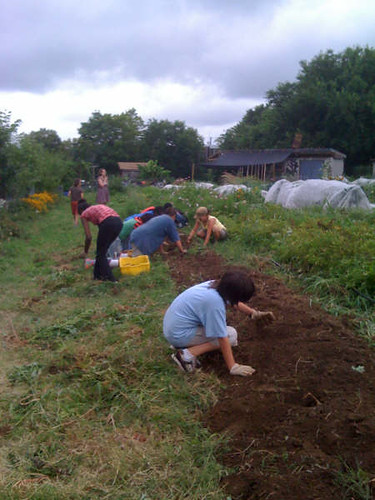It’s an early summer afternoon and West Philadelphia’s Mill Creek Farm is a bustle of activity. Co-founders Johanna Rosen and Jade Walker pick asparagus sprigs thicker than a human thumb while volunteer farmers work on verdant arugula patches and neighbors pop in to say hello.
 Photo courtesy Mill Creek FarmSchoolchildren dig for potatoes at Mill Creek Farm.
Photo courtesy Mill Creek FarmSchoolchildren dig for potatoes at Mill Creek Farm.
This is a major change of scene for the two-acre plot. Before it became a farm six years ago, the Mill Creek site was a vacant plot filled with trash. Rosen and Walker managed to get a 99-year lease for the lot, which is managed by Philadelphia’s Redevelopment Authority (RDA). The catch? Should the RDA call for it, the two would be kicked out with just 30 days notice.
The two women are far from alone in their predicament. All across Philadelphia — a city with over 400 documented food production sites — farmers and gardeners operate under the reality that their lots could be taken away at any time. Just down the road from Mill Creek Farm, Sloan St Garden is in the process of being evicted. Farther east, the Berks Street and children’s community garden was recently built over by a city housing project. “Every (lease) situation is different but the problem is definitely citywide,” says Rosen.
What spearates Mill Creek Farm from the rest, however, is that its land is likely unusable for anything but food production. The Mill Creek, after which the farm is named, runs under the property, compromising the structural stability of surrounding land. As Anne Spirn, Professor of Landscape Architecture at MIT who has studied the Mill Creek Watershed for over two decades, said at a public forum recently: “The Mill Creek sewer undermines sidewalk and building foundations, posing a general hazard to the surrounding community.” Indeed, public housing built on the site in past decades fell in, damaging property and injuring homeowners.
Despite such evidence, the city has so far been unwilling to designate the Mill Creek Farm site as a permanent green space. Despite outward praise for the land management and community building services urban gardens like Mill Creek Farm provide, the city has yet to make their protection and management a coordinated priority. Those who try to buy urban farmland from the city come up against the infamously impenetrable world of Philadelphia politics. “There’s more and more talk nowadays about local food, grown without pesticides,” Walker says, “but the people and places that are doing that work are still marginalized.”
 Photo courtesy Mill Creek FarmJade Walker (in brown hat) at Mill Creek Farm’s bright green market stand.
Photo courtesy Mill Creek FarmJade Walker (in brown hat) at Mill Creek Farm’s bright green market stand.
To look at more established urban farming centers like the San Francisco Bay, the answer would appear to be political organizing. Following aggressive lobbying efforts by organizations like San Francisco Urban Agricultural Alliance, San Francisco’s Board of Supervisors recently passed legislation that allows agricultural activities to operate throughout the city, making it one of the country’s most progressive urban agriculture policies. In Seattle, urban agriculture organizations have the collective power to push for the formation of Food Policy Councils and streamline municipal codes restricting urban agricultural efforts.
Back in Philadelphia, Rosen and Walker recognize the need for mobilization but remain realistic about what it takes to spearhead such organizing efforts. “Coalition-building is necessary and we’re working on it, but these things take time,” Rosen says. “There’s only so many hours in the day, and we like to spend some of them farming.”
For now, the two are operating on the assumption that Mill Creek Farm will be around for the coming years. As Walker says: “What else can you do?”
We don’t have a paywall because, as a nonprofit publication, our mission is to inform, educate and inspire action to protect our living world. Which is why we rely on readers like you for support. If you believe in the work we do, please consider making a tax-deductible year-end donation to our Green Journalism Fund.
Donate